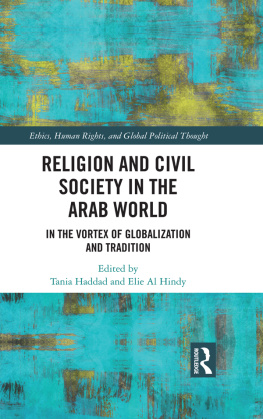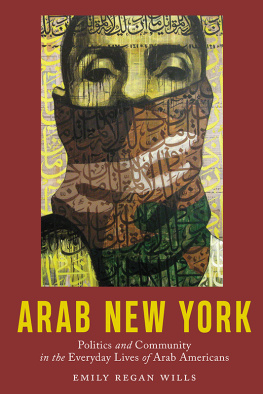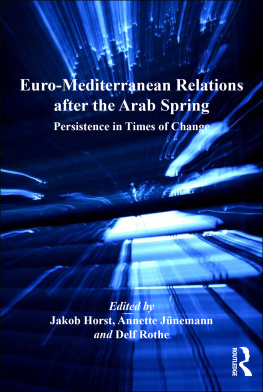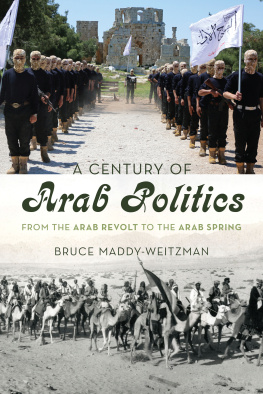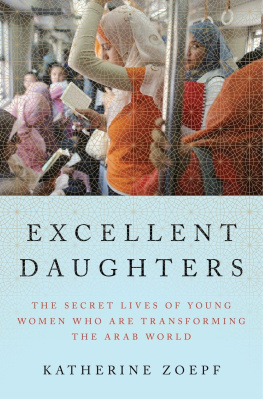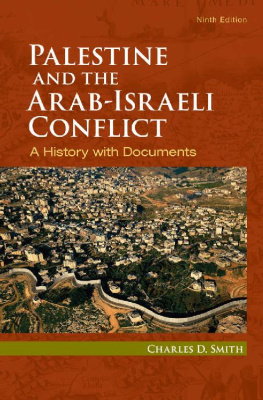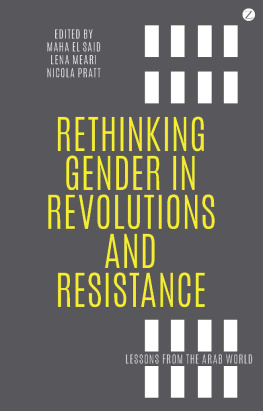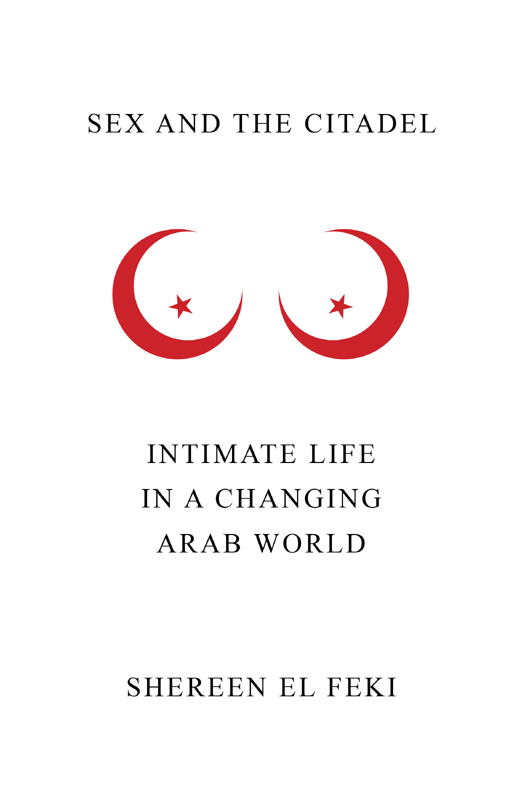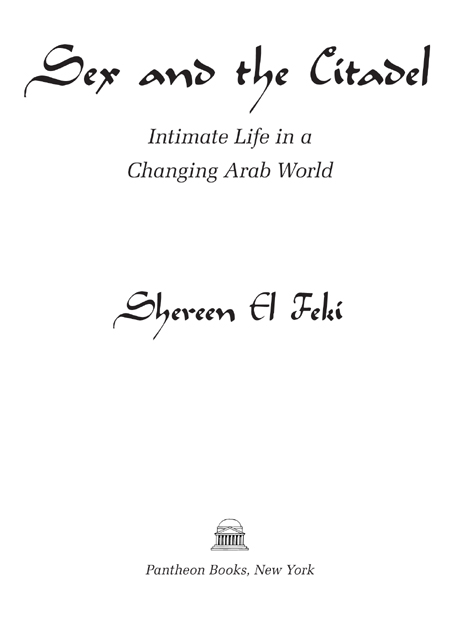Copyright 2013 by Shereen El Feki
All rights reserved. Published in the United States by Pantheon Books, a division of Random House, Inc., New York, and in Canada by Doubleday Canada, a division of Random House of Canada Limited, Toronto. Simultaneously published in the United Kingdom by Chatto & Windus, an imprint of the Random House Group Limited, London.
Pantheon Books and colophon are registered trademarks of Random House, Inc.
Library of Congress Cataloging-in-Publication Data
El Feki, Shereen.
Sex and the Citadel : intimate life in a changing Arab world / Shereen El Feki.
p. cm.
Includes bibliographical references.
eISBN: 978-0-307-90743-1
1. SexEgypt. 2. WomenSexual behaviorEgypt. 3. EgyptiansSexual behavior. 4. EgyptSocial conditions21st century. I. Title.
HQ18.E3E42 2012 306.70962dc23 2012018002
www.pantheonbooks.com
Jacket design by Brian Barth
v3.1
For my parents
I swear by God there is a need to know this subject; those who do not know it, or make fun of it, are ignorant, stupid, of little understanding.
Umar Muhammad al-Nafzawi,
The Perfumed Garden (fifteenth century)
Let us admit, once and for all, that sex is the basic principle around which all the rest of human life, with all its institutions, is pivoted.
Magnus Hirschfeld, Women East and West:
Impressions of a Sex Expert (1935)
Contents
A Note on Language
A few years ago, I was invited to visit a foundation for womens rights in Cairo. The staff and I talked in English, which they spoke far more fluently than I did Arabic. At the end of an impressive tour, however, I tried to rise to the occasion. Thank you, I struggled in my very best Arabic, for inviting me to your womans center. There was an awkward pause and some curious looks from my hosts, but the moment quickly passed, and with the hospitality that Egyptians are famous for, we parted with handshakes and smiles all around.
It wasnt until later, when some Egyptian friends burst out laughing as I told them the story, that I discovered the source of the confusion. But, Shereen, you thanked them for visiting their center for sluts! Through a subtle mispronunciation of the Arabic word for woman, I had put their organization into a different line of business altogether.
Such adventures in Arabic have made me all the more conscious of helping readers to get it right. So in this book, where Arabic words are transliterated into English, I have followed the gold standard of the International Journal of Middle East Studies; for simplicitys sake, however, diacritical marks have been omitted. Two Arabic letters that have caused me plenty of trouble over the years, including the episode above, are represented by for ayn and for hamza.
When Im talking about Egypt, Ive sometimes parted ways with IJMES, transliterating words to capture local pronunciation. So its ahwa instead of qahwa, Gamal instead of Jamal, and so on. There are, inevitably, exceptions to this exception. For example, where Arabic words have made their way into English, they are not italicized and I have opted not to Egyptianize them in most casesthat means hijab, instead of hegab, for instance. The same applies for plurals. Where words have crossed into English, I use s; otherwise, I have retained the original Arabic plural form. So thats fatwa and fatwas (not fatawa); faqih and fuqaha (not faqihs). I have also used the common English spelling for names of places and well-known people, past and present.
Introduction
What is it?
Six pairs of dark eyes stared at meor rather, at the small purple rod in my hand.
Its a vibrator, I answered, in English, racking my brain for the right Arabic word. A thing that makes fast movements came to mind, but as that could equally apply to a hand mixer, I decided to stick with my mother tongue to minimize what I could sense was rising confusion in the room.
One of the women, curled up on a divan beside me, began to unpin her hijab, a cascade of black hair falling down her back as she carefully put her headscarf to one side. What does it do? she asked.
Well, it vibrates, I added, taking a sip of mint tea and biting into a piece of syrupy baklava to buy myself some time before the inevitable rejoinder.
But why?
How I came to be demonstrating sex toys to a coffee morning of Cairo housewives is a long story. I have spent the past five years traveling across the Arab region asking people about sex: what they do, what they dont, what they think and why. Depending on your perspective, this might sound like a dream job or a highly dubious occupation. For me, it is something else altogether: sex is the lens through which I investigate the past and present of a part of the world about which so much is written and still so little is understood.
Now, I grant you, sex might seem an odd choice, given the spectacle of popular revolt playing out across the Arab world since the beginning of this decade, which has taken with it some of the regions most entrenched regimesin Egypt, Libya, Tunisia, and Yemen for startersand is shaking up the rest. Some observers, however, have gone so far as to argue that it was youthful sexual energy that fueled the protests in the first place. Im not so sure. While Ive often heard Egyptians say their fellow countrymen spend 99.9 percent of their time thinking about sex, in the heady days of early 2011, making love appeared, for once, to be the last thing on peoples minds.
Yet I dont believe it was entirely out of sight. Sexual attitudes and behaviors are intimately bound up in religion, tradition, culture, politics, and economics. They are part and parcel of sexualitythat is, the act and all that goes with it, including gender roles and identity, sexual orientation, pleasure, intimacy, eroticism, and reproduction. As such, sexuality is a mirror of the conditions that led to these uprisings, and it will be a measure of the progress of hard-won reforms in the years to come. In his reflections on the history of the West, the French philosopher Michel Foucault described sexuality as an especially dense transfer point for relations of power: between men and women, young people and old people, parents and offspring, teachers and students, priests and laity, an administration and a population. The same is true in the Arab world: if you really want to know a people, start by looking inside their bedrooms.
Had it not been for the events of September 11, 2001, I might never have opened that door. I was working at The Economist when the world turned. Having trained as an immunologist before becoming a journalist, I was on the health and science beat, far removed from the great political debates of the day. From these sidelines, I had a chance to sit back and watch my colleagues grapple with the complexities of the Arab region. I saw their confidence in Anglo-American might and exuberance in the early afterglow of the war in Iraq gradually turn to doubt, then bewilderment. Why werent Iraqis rushing to embrace this new world order? Why did they rarely follow the playbook written in Washington and London? Why did they behave in ways so contrary to Western expectations? In short, what makes them tick?
For me, these are not questions of geopolitics or anthropology; this is a matter of personal identity. The Arab world is in my blood: my father is Egyptian, and through him my family roots stretch from the concrete of Cairo to cotton fields deep in the Nile Delta. My mother comes from a distant green valleya former mining village in South Wales. This makes me half Egyptian, though most people in the Arab region shake their heads when I tell them this. To them there is no half about it; because my father is wholly Egyptian, so am I. And because he is Muslim, I too was born Muslim. My mothers family is Christian: her father was a Baptist lay preacher, and her brother, in a leap of Anglican upward mobility, became a vicar in the Church of Wales. But my mother converted to Islam on marrying my father. She was not obliged to; Muslim men are free to marry


